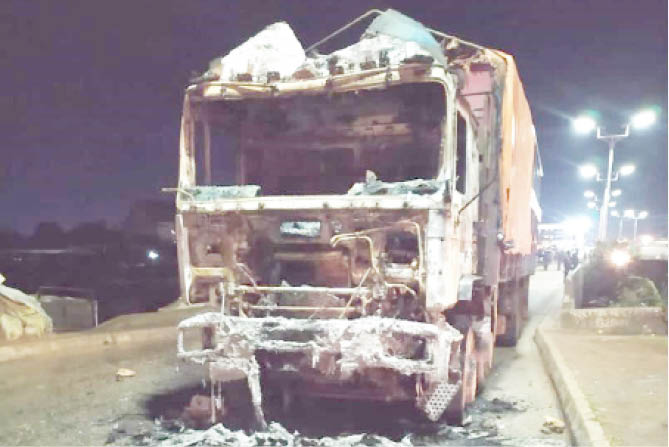Something happened in Jos last week. Again. A people provoked by some grave injustice poured onto the street and in the mid-morning sun hacked to death people who did not offend them in the first place, people who happened to be travellers passing through the city to return to their families. About 30 people have been reported killed. Nearly a dozen more are missing.
Of course, this senseless massacre, parts of it captured and circulated on video phone footages, is gory and savage, belonging more in the dark ages than in the 21st century. It has dominated conversations since the weekend. As I write, Jos has been under a 24-hour curfew for days to stop a contagion of a full-scale breakdown of order.
- BBNAIJA: Why I don’t like Angel, Maria tells Big Brother
- Pupils abducted as bandits break into Islamic school in Katsina
What most of these conversations glossed over or failed to acknowledge was that before the massacre this weekend, there was another a couple of weeks back, in the shadow of the night, when some men said to be herdsmen raided a Miango village at the end of July and killed some people, torched houses and farmlands and melted into the night. Even fewer people talked about that massacre. On social media, that irrepressible chatterbox, there was a near-total silence save for a few isolated voices, from those whose villages and kinsmen were the victims.
But before that massacre of a few weeks back, there was reportedly another, this time of some herdsmen allegedly killed by the villagers who happen to be of a certain tribe. No one talked about these killings except perhaps on the herdsmen grapevine.
What is certain is that even before this reported killing of the herdsmen, there is a chain of killing and counter killings going back some 20 years. Over these two decades, we have tried nonchalantly to shove these killings under the carpet. Now, the carpet is soggy with blood, bulging with corpses, mountains of unresolved angst from undocumented and unresolved massacres that it is surprising we still have a foothold to stand.
This latest conflagration in Jos ironically comes just a few weeks shy of the 20th anniversary of that day in September 2001 when the city lost its innocence and became a keg of gunpowder sitting on an open flame.
It is 2021, and like 2001, the Taliban is in charge in Afghanistan and Jos is in turmoil. Obviously, no direct correlation between the two but just to point out the cyclical nature of life and conflict and how problems that are not properly addressed have a way of resurfacing, even after two decades.
In the aftermath of the killings last week, I have received reports of Christians disappearing in Muslim areas and Muslims not returning from Christian parts of town. Yet in the midst of all this, the stories of Christians saving Muslims from that massacre filtered through. These narratives are subdued and what most people have seen are videos of the brutal killings, which have triggered isolated revenge killings in certain parts of the city. Something that the 24-hour curfew has helped to curtail.
Unfortunately, what is certain—and this does not take science or witchcraft to arrive at—is that this conflagration, this madness, this mass hysteria will happen again. The reason is simple. What provoked this latest uproar was a failure of grievances to be addressed.
From antecedent over the last two decades, the government has arrived at a formula for dealing with these issues without actually dealing with them. Step one: Impose a curfew. Step two: Assure that you are “on top of the situation” and make inane threats of dealing with trouble makers. Step three: Wait for the return of calm and then ease the curfew. Step four: Enjoy, commend and celebrate the pretend-peace until you can’t pretend anymore. Step five: Rinse and repeat.
In none of these steps, is there any serious committed effort to actually deal with the root causes and ensure there is no recurrence? People who commit mass murder are allowed to get away with it and people whose loved ones, neighbours are brutally murdered and whose businesses or homes were torched and looted are allowed to nurse their pain, their grief and that demonic spirit of vengeance.
The causes of the crises, despite several committees and white and blue papers, have remained unaddressed. I remember that in the aftermath of the first crisis in 2001, the Joshua Dariye administration set up a panel to investigate the “remote and immediate causes” of the conflict. I remember attending some of the public hearings of that committee. A report was prepared and submitted to the government. As expected, that report was shelved, never to be revisited. Dariye was replaced by Michael Botmang, who himself was replaced by Jonah Jang who has since been replaced by Simon Lalong and between these four governors, that report and the many others that have followed the series of conflicts in the state have failed to address the “remote and immediate causes” or those who instigate or perpetrate them.
Somethings are not meant to be papered over. The continued killings of thousands over two decades is one such thing. These series of violence have cut deep into the heart of this city. This deep wound has been allowed to fester for far too long.
Over the years, there have been efforts to reconcile the inhabitants of this city through mostly private efforts of individuals or groups as aptly captured by Nathaniel Bivan for Human Angle in his series, The Divided City. The state government did establish the Plateau Peace-Building Agency, whose mission is to parch the peace not tackle the problem, which it is not equipped or mandated to.
Sincere and commendable as these peace-building efforts are, they remain cosmetic, akin to dressing a cancerous sore in a silk veil. A veil easily blown away by a gust of intemperate winds. This weekend’s occurrence has greatly eroded the progress made over the years to rebuild peace and trust in this city.
Mistakes have been made, starting with General Ibrahim Babangida, who as a military president decided not to make an example of his friend, General Zamani Lekwot, who in 1992 was convicted by a special tribunal for instigating the Zango Kataf riots of 1987. That opportunity to set the standard of intolerance for civil unrest is one Nigeria has continued to rue. Dozens of politicians, power mongers and guzzlers and civil servants have sponsored, actively facilitated and incited such violence to protect or advance their interests at the expense of innocent Nigerian lives. They have never been cautioned, jailed or otherwise punished. Most have ended up being rewarded with chieftaincy titles or government appointments.
That decision by IBB inadvertently led to the legitimisation of violence as a tool of political and social pressure and resulted in the spiralling chaos we witness today.
It is why Niger Delta militants went berserk and held the country to ransom knowing they can escape justice if their tribal groups cry foul when the authorities come for them, the same trick criminal herdsmen are using to enjoy immunity from the law. Today, we have dozens of Boko Haram fighters coming out of the forest to claim “repentance.”
Repentance for such criminal deeds against the state and its citizens should not under any circumstance translate to a total absence of consequence for their days of killing, maiming and abductions. At the very least, it should mean a reduced jail term for those who willingly surrender, not the lack of it. Repentance means paying for your crimes, not escaping the consequences.
Until this concept is applied across the board, from Jos to Kaduna to the banditry in the North West to the cult killings in the South-South and South East, to Boko Haram in the North East and the herders-farmers clashes all over, until we stop celebrating pretend-justice and true justice is seen to be done, that criminal actions have consequences, Jos will continue to happen, as would banditry, as would Boko Haram and everything else that continues to claim the lives of the innocents.
The way I see it, we may choose to do the right thing now or continue sweeping things mountains of corpses under a blood-soaked carpet that no longer has room for more.

 Join Daily Trust WhatsApp Community For Quick Access To News and Happenings Around You.
Join Daily Trust WhatsApp Community For Quick Access To News and Happenings Around You.


